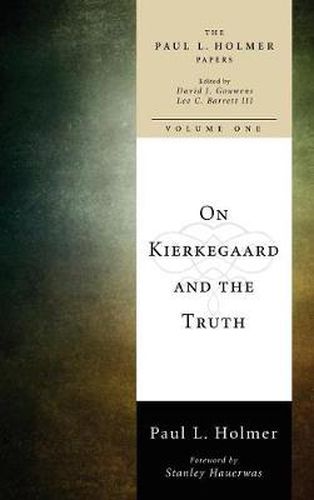Readings Newsletter
Become a Readings Member to make your shopping experience even easier.
Sign in or sign up for free!
You’re not far away from qualifying for FREE standard shipping within Australia
You’ve qualified for FREE standard shipping within Australia
The cart is loading…






This title is printed to order. This book may have been self-published. If so, we cannot guarantee the quality of the content. In the main most books will have gone through the editing process however some may not. We therefore suggest that you be aware of this before ordering this book. If in doubt check either the author or publisher’s details as we are unable to accept any returns unless they are faulty. Please contact us if you have any questions.
Paul L. Holmer (1916-2004) was Professor of Philosophy at the University of Minnesota (1946-1960) and Noah Porter Professor of Philosophical Theology at Yale Divinity School (1960-1987). Among his many acomplishments, Holmer was one of the most significant American students of Kierkegaard of his generation. Although written in the 1950s and 1960s, Holmer’s theological and philosophical engagement with Kierkegaard challenges much in the contemporary scholarly discussions of this important thinker. Unlike many, Holmer refuses reductionist readings that tie Kierkegaard to any particular school. He likewise criticizes biographical readings of Kierkegaard, much in vogue recently, seeing Kierkegaard rather as an indirect communicator aiming at his reader’s own ethical and religious capacities. Holmer also rejects popular existentialist readings of Kierkegaard, seeing him as an analyzer of concepts, while at the same time denying that he is a crypto-analyst. Holmer criticizes the attempt to construe Kierkegaard as a didactic religious thinker, appreciating Kierkegaard’s cool descriptive objectivity and his ironic and stylistic virtuosity. In his important reading of Kierkegaard on truth, Holmer pits Kierkegaard against those who see truth empirically, idealistically, or relativistically. Holmer’s carefully textured account of Kierkegaard’s conceptual grammar of truth in ethical and religious contexts, fifty years after it was penned, addresses immediately current discussions of truth, meaning, reference, and realism versus antirealism, relativism, and hermeneutics. It will be of great interest to all interested in Kierkegaard and his importance for contemporary theology and philosophy. This is the first volume of The Paul L. Holmer Papers, which includes also volume 2, Thinking the Faith with Passion: Selected Essays, and volume 3, Communicating the Faith Indirectly: Selected Sermons, Addresses, and Prayers.
$9.00 standard shipping within Australia
FREE standard shipping within Australia for orders over $100.00
Express & International shipping calculated at checkout
This title is printed to order. This book may have been self-published. If so, we cannot guarantee the quality of the content. In the main most books will have gone through the editing process however some may not. We therefore suggest that you be aware of this before ordering this book. If in doubt check either the author or publisher’s details as we are unable to accept any returns unless they are faulty. Please contact us if you have any questions.
Paul L. Holmer (1916-2004) was Professor of Philosophy at the University of Minnesota (1946-1960) and Noah Porter Professor of Philosophical Theology at Yale Divinity School (1960-1987). Among his many acomplishments, Holmer was one of the most significant American students of Kierkegaard of his generation. Although written in the 1950s and 1960s, Holmer’s theological and philosophical engagement with Kierkegaard challenges much in the contemporary scholarly discussions of this important thinker. Unlike many, Holmer refuses reductionist readings that tie Kierkegaard to any particular school. He likewise criticizes biographical readings of Kierkegaard, much in vogue recently, seeing Kierkegaard rather as an indirect communicator aiming at his reader’s own ethical and religious capacities. Holmer also rejects popular existentialist readings of Kierkegaard, seeing him as an analyzer of concepts, while at the same time denying that he is a crypto-analyst. Holmer criticizes the attempt to construe Kierkegaard as a didactic religious thinker, appreciating Kierkegaard’s cool descriptive objectivity and his ironic and stylistic virtuosity. In his important reading of Kierkegaard on truth, Holmer pits Kierkegaard against those who see truth empirically, idealistically, or relativistically. Holmer’s carefully textured account of Kierkegaard’s conceptual grammar of truth in ethical and religious contexts, fifty years after it was penned, addresses immediately current discussions of truth, meaning, reference, and realism versus antirealism, relativism, and hermeneutics. It will be of great interest to all interested in Kierkegaard and his importance for contemporary theology and philosophy. This is the first volume of The Paul L. Holmer Papers, which includes also volume 2, Thinking the Faith with Passion: Selected Essays, and volume 3, Communicating the Faith Indirectly: Selected Sermons, Addresses, and Prayers.